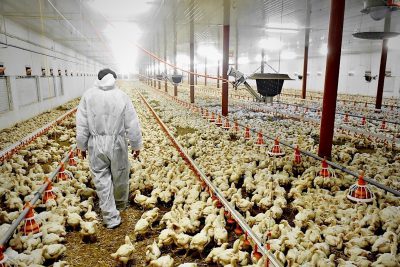If you’ve eaten pork in the last two decades, odds are good you’ve also unwittingly consumed at least some amount of ractopamine, a growth-promoting drug that factory farms routinely add to animal feed to promote muscle growth. Developed by Elanco, the world’s second largest manufacturer of animal drugs, ractopamine mimics the effects of stress hormones and allows companies to produce more meat more quickly with less feed—great for their pocketbooks, not so great for animals or consumers. Read on to find out what factory farm drugs mean for animals and for us.
Factory Farm DRUg harms pigs
Soon after the U.S. Food and Drug Administration (FDA) approved the use of ractopamine in pigs raised for food (based largely on studies conducted by Elanco itself), slaughterhouse inspectors began to report increased rates of nonambulatory or “downed” pigs. These are animals who are unable to stand or walk, and they often suffer horrifically at slaughterhouses, trampled by other pigs, dragged by workers, and electric prodded while they squeal out in pain.
The FDA accused Elanco of improperly withholding information about the safety and effectiveness of ractopamine, as well as its adverse impacts on animals. An investigation of FDA records revealed that ractopamine was linked to more than 218,000 adverse reports in pigs—more “than any other animal drug on the market”. The incidents reported included trembling, broken bones, lameness, and death. As a result, the drug now bears a label warning, “CAUTION: Ractopamine may increase the number of injured and/or fatigued pigs during marketing.”
Despite all of this, the U.S. still allows—and even incentivizes—the use of ractopamine, right up to the day of slaughter, leaving residues in meat.
In addition to pigs, the FDA now also allows the drug to be used in turkeys and cows raised for food. It has been linked to increased mortality in both species.
effects oF FACTORY FARM DRUG on people
And what about ractopamine’s effects on humans? Only one of Elanco’s tests submitted to the FDA involved humans, and it involved just six people—one of whom dropped out after experiencing abnormal heart racing. Two decades later, we still know very little about the drug’s human health impacts. But according to the Center for Food Safety, it has “been linked to heart problems and even poisoning in humans”.
factory farm drugged banned in other countries
In the face of such serious risks, the vast majority of the world’s countries—an estimated 80%, or 160 of 196 countries—have banned or restricted the use of ractopamine. This includes China, the world’s largest consumer of pork, as well as the entire European Union.
But in the U.S., wide ractopamine use continues. And the meat industry, Elanco, and the U.S. government aggressively lobby other countries to buy our ractopamine-laced meat.
lobbying to use drugs
After years of disregarding efforts by animal and consumer advocates, mega producers JBS and Tyson recently announced that they were banning ractopamine from their supplies. That change is not because they suddenly care about animals or consumers, but is a play for China’s massive and highly lucrative pork market: the recent crisis of African swine fever that is afflicting hundreds of millions of pigs in more than fifty countries is increasing the demand for U.S. pork. In China, more than half of the nation’s pigs have died or been subjected to wholesale extermination—some in horrific mass live burials. Producers, like JBS and Tyson, have wasted no time in swooping in to seek profit from others’ misery.
Even this small reprieve may not last long. The industry is escalating its efforts to pressure China and other countries to lift their bans on ractopamine, so that U.S. pig producers can have the best of both worlds—business as usual and even greater profits. All while pigs suffer and humans are exposed to these factory farm drug residues.
What you can do
- Click on the above links to learn more about ractopamine and the problems it causes.
- Share this information with your friends, family and colleagues, as well as in media blogs and letters to the editor.
- Be an effective consumer advocate: tell the pork industry to stop using ractopamine. You can contact the National Pork Producers Council. Or, reach out to the top pork producing companies in the U.S.
- Follow and support the work being done by the first and only Animal Law Litigation Clinic, at Lewis & Clark Law School, focused exclusively on farmed animal issues.
- Peace begins on your plate; say “Auf Wiedersehen” (goodbye) to pork!
By Delcianna Winders, Assistant Clinical Professor & Clinic Director, Animal Law Litigation Clinic, Center for Animal Law Studies at Lewis & Clark Law School




